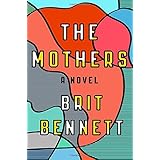
What a fabulous year for readers! I can't remember the last time there were so many stellar writers debuting novels of such sophistication and depth. Especially gratifying is that they are women, Emma Cline, Yaa Gyasi, Nicole Dennis-Benn, to mention just a few of my favorites in 2016. And now, Brit Bennett (http://britbennett.com/about/), a winner of the National Book Foundation's 5 Under 50 award, with an Ivy League education that includes Stanford, the University of Michigan, and Oxford. Whew!
We first meet Nadia Turner through the eyes of "the mothers," the elders of the Upper Room Chapel, who keep keen eyes on the youth of their parish. These women pride themselves on their observations about all the members of their Oceanside, California, community but they are not above spreading gossip based on false assumptions and misinformation. The onus is on the reader to parse what we learn from the mothers with what we learn from the first person narration of the three main characters themselves.
The mothers were the last people to see Nadia's mom alive and they wonder, in hindsight of course, what they might have done differently if they'd known she intended to kill herself. Nadia and her father both died a little bit that day, their grief internalized, creating an impenetrable wall that neither seem able to breach.
Nadia's search for anything to fill the hole in her heart begins with the usual suspects, drugs and alcohol, and ends in a secret fling with the pastor's son, Luke Sheppard, a man fighting his own demons. They know it won't last, after all, Nadia is heading off to college the following year, to Michigan on a full scholarship. So when she finds out that she's pregnant, it never occurs to her that Luke might have mixed feelings about the child he'll never know. This lack of insight into Luke's true character has ramifications for each member of the Upper Room over the next several years.
Absent mothers, whether physically or emotionally, are an integral part of Ms. Bennett's novel. Aubrey's mom is alive but has chosen her boyfriend over her daughter. Abandoned, Aubrey moves in with her sister and her sister's partner and joins the Upper Room seeking a safe haven. There she meets Nadia, one empty girl seeking out another. Nadia is drawn to Aubrey's innocence and to the home she has made with her sister, harboring an aching envy that Bennett describes in this gorgeously written sentence,
"Monique and Kasey's love for Aubrey hung in their eyes, and even though it wasn't meant for Nadia, she inched closer, holding her hands up to the warmth."
Can't you just see it? Insightful sentences like this jump off many pages in "The Mothers," a book that holds so much pain, loss, and misunderstanding behind its cover that if feels like it should have come from a much older soul. Bennett examines grief, loyalty, friendship, and love, along with the seemingly unbreakable bond between parents and children. Lots of material here for book groups.



